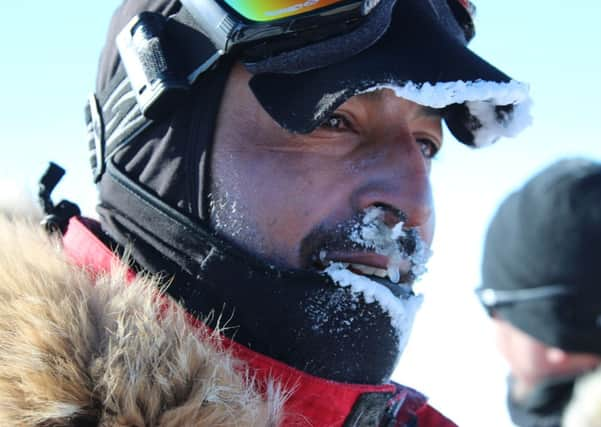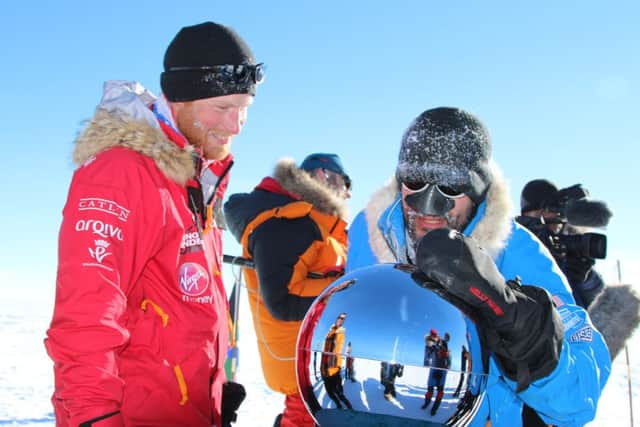Wounded heroes show true courage in ice trek


HE conquered Kilimanjaro, endured fitness training in Iceland and spent hours in an ice chamber, but nothing quite prepared Ibrar Ali for the challenge of trekking to the South Pole.
The former Yorkshire Regiment captain, from Selby, in North Yorkshire, spent more than three, gruelling weeks pulling his sled across the frozen wastes of Antarctica before finally standing at the bottom of the world at midday on December 13.
Advertisement
Hide AdAdvertisement
Hide AdThe 36 year-old, who lost his right arm while serving in Iraq, was among the brave band of wounded soldiers taking part in the South Pole adventure to raise money for the Walking With The Wounded charity, which supports injured army veterans.


He was part of Team Glenfiddich UK, featuring Prince Harry as patron, that set off last November in a race to the Pole against teams from the United States and the Commonwealth. Each team had four injured servicemen and women as well as a guide and a mentor and travelled up to 12 miles (20km) a day in temperatures which, at times, dropped to a bone-chilling minus 45C.
They arrived at Novo airbase on Antarctica before setting off on their epic 200-mile journey and Ali, or “Ibi” as he prefers to be called, admits it proved tougher than any of them anticipated. “It was a lot harder than we thought it would be just because of the terrain and the altitude,” he says. “We did all the build-up training beforehand but the terrain was so unexpected, not even the guides had seen it like this before at the South Pole.”
The teams had prepared for the ice, extreme cold and bitter winds, but not the undulating terrain.
Advertisement
Hide AdAdvertisement
Hide AdNobody had been out to the region during the past 12 months so the changing landscape came as an unwelcome surprise. “We were expecting fairly smooth ice and instead we had to deal with ridges that were between one and three feet high.”
This might not sound particularly challenging but it is when you’re carrying a sled weighing 11st (70kg) with all your kit, and you’re an amputee.
“Trying to pull the sledges over all these ridges was very difficult and it was much more exhausting than we’d anticipated because we were having to concentrate a lot more. So awe didn’t go as quickly as we’d hoped.”
Ibi questioned what he’d let himself in for. “The initial three or four hours on the first day were the toughest. I hadn’t properly acclimatised to the weather and the altitude and became a bit dehydrated and started over heating.”
Advertisement
Hide AdAdvertisement
Hide AdIt soon became apparent that it wasn’t a question of who would reach the pole first but whether all the teams would get there in one piece.
Originally the challenge was a race between the three teams which, as well as Prince Harry, featured Hollywood actor Alexander Skarsgard, star of the hit series True Blood, in the US team; and Sheffield-born actor Dominic West, from the popular series The Wire, in the Commonwealth group.
However, with the teams struggling to cope, the organisers were forced to suspend the competition and turn the expedition into a joint effort. The teams joined forces taking 10 minute breaks every couple of hours to boost their energy levels with protein bars and chocolate.
Ibi says the landscape was unlike anything he’d ever seen before. “It was like a frozen ocean with mile after mile of little peaks. They weren’t hills but you were dealing with a sloping gradient which makes it hard work when you’re going uphill for seven or eight hours.”
Advertisement
Hide AdAdvertisement
Hide AdAlthough Antarctica is in the middle of its summer at the moment it’s still a frozen wilderness. “Once we got out on to the plateau we were quite lucky and the temperature was usually around minus 35. The big problem was the wind chill and there were a couple of days when that caused difficulties.”
As anyone who’s been to Antarctica will tell you frostbite can set in very quickly, even if you think you’re properly covered up, as Ibi found to his cost. “I had a bit of frostbite on my thumb. On one of the days when the wind chill was bad there was a slight gap between my gloves and the sleeve of my jacket and even though I had two further layers of gloves it got in there.”
Thankfully he realised something was wrong and after being treated by the team doctor he was able to carry on.
Once the race was abandoned the three teams worked together to help each other out. “There was a real sense of camaraderie and we got to chat with members of the other teams and find out about their stories.” There were some lighter moments, too. “The Ashes were on at the time so we got a bit of stick, especially from the Commonwealth team,” he says.
Advertisement
Hide AdAdvertisement
Hide AdIbi also got to spend a bit of time with Prince Harry. “He slotted straight in and I would say he was one of the strongest members of our team. I think the fact that we had a shared military experience helped because it meant we could talk in our own language and you didn’t have to explain where Helmand was and things like that.”
He says reaching the South Pole was a great moment but for him the biggest thrill came the night before. “That was when we could see the US research station which was about 12 kilometres away and we knew that the end was in sight.
“Standing at the South Pole was great but when we saw the station on the horizon it was the first thing we’d seen in weeks.
“Up to that point it had just been day after day of ice and blue sky and because of the curvature of the Earth you couldn’t see the horizon.”
Advertisement
Hide AdAdvertisement
Hide AdAfter leaving Antarctica, Ibi arrived back at Heathrow where he was met by his five year-old daughter, Zara, and his girlfriend Alexandra, before heading home to Yorkshire just in time for Christmas.
He’s been back home almost a month now and having left the Army last year, having served just over 10 years in the Yorkshire Regiment, he now hopes to go to university to do a masters degree in postwar recovery and development.
It’s more than six years since he was badly wounded when his patrol was hit by a roadside bomb that killed one of his colleagues and although he’s had to endure moments of anguish he believes his injury has made him stronger.
“When you go through something like that it does make you stronger and it helps strengthen the mind, because the body will go where the mind puts it.”
Advertisement
Hide AdAdvertisement
Hide AdHe took part in the expedition to honour the memory of comrades who were killed and especially two who died in Iraq as he was taking part in the selection for the South Pole challenge.
“It was quite poignant when those two fellows were killed while I was on selection for this event,” he says. “Our losses have been quite high, as they have been through every unit in the armed forces, and I really wanted to honour all of them but especially those two guys.”
He has a deep sense of loyalty to his former Army colleagues but is unassuming about what he has achieved. “Military personnel aren’t given over to congratulating themselves and I suppose the scale of what we’ve done hasn’t sunk in.
“But for me it’s all about doing what I can to raise awareness about the challenges facing injured Army servicemen and women.
Advertisement
Hide AdAdvertisement
Hide Ad“It’s not about me getting to the South Pole, the most important thing is to raise money for the charity to help all the guys who come home and need retraining and re-education.”
To support Walking With The Wounded visit the charity’s Virgin Money Giving page by going to uk.virginmoneygiving.com/giving/southpole2013/
The charity trekkers helping injured army personnel
Walking With The Wounded is a UK-based charity that funds the re-training and re-education of wounded servicemen and women with the aim of helping them find long- term employment after leaving the Armed Forces.
The organisation stages extreme expeditions to illustrate the extraordinary determination and courage of these injured individuals, which it uses to draw attention to the need to help in their career transition, and to raise funds for charity.
Advertisement
Hide AdAdvertisement
Hide AdPrevious expeditions have included the North Pole in 2011, this involved a 13-day trek of around 190 miles across the polar ice cap. For its latest challenge the charity is entering its first team into what is regarded as the toughest foot race in the world - The Marathon Des Sables 2014.
The total raised by Walking With The Wounded since its inception in 2010 is £3.5m, with more than £100,000 raised from the South Pole expedition just from its Virgin Money page alone.
For more information visit: www.walkingwiththewounded.org.uk.